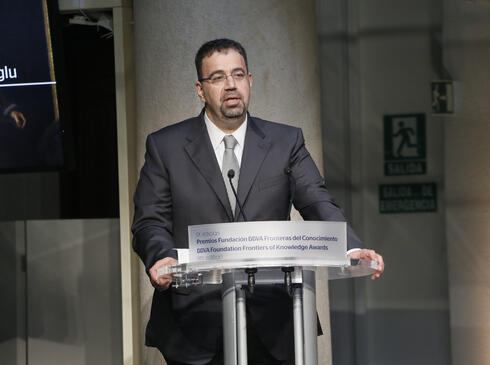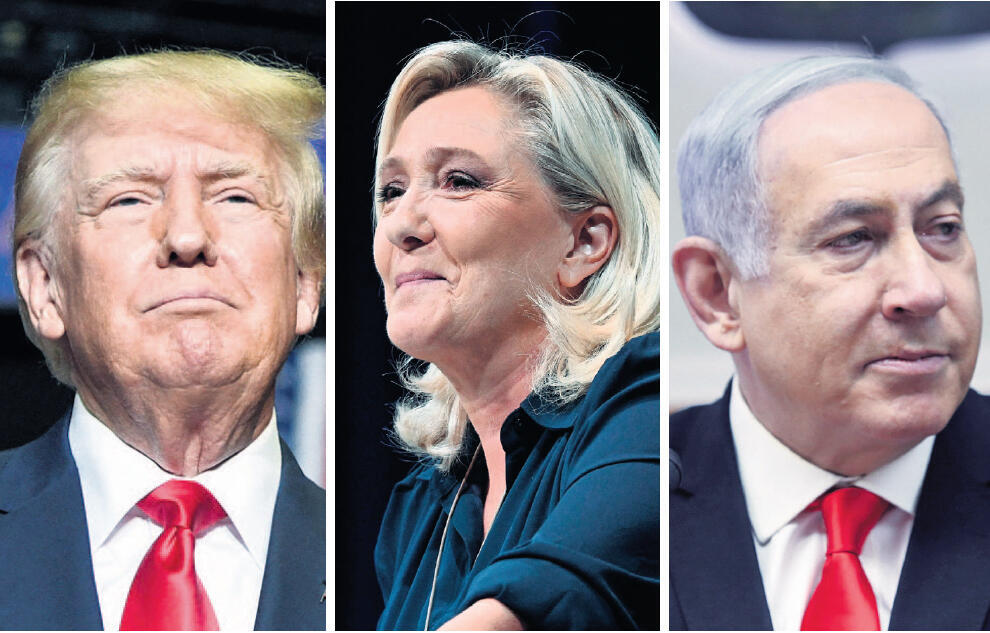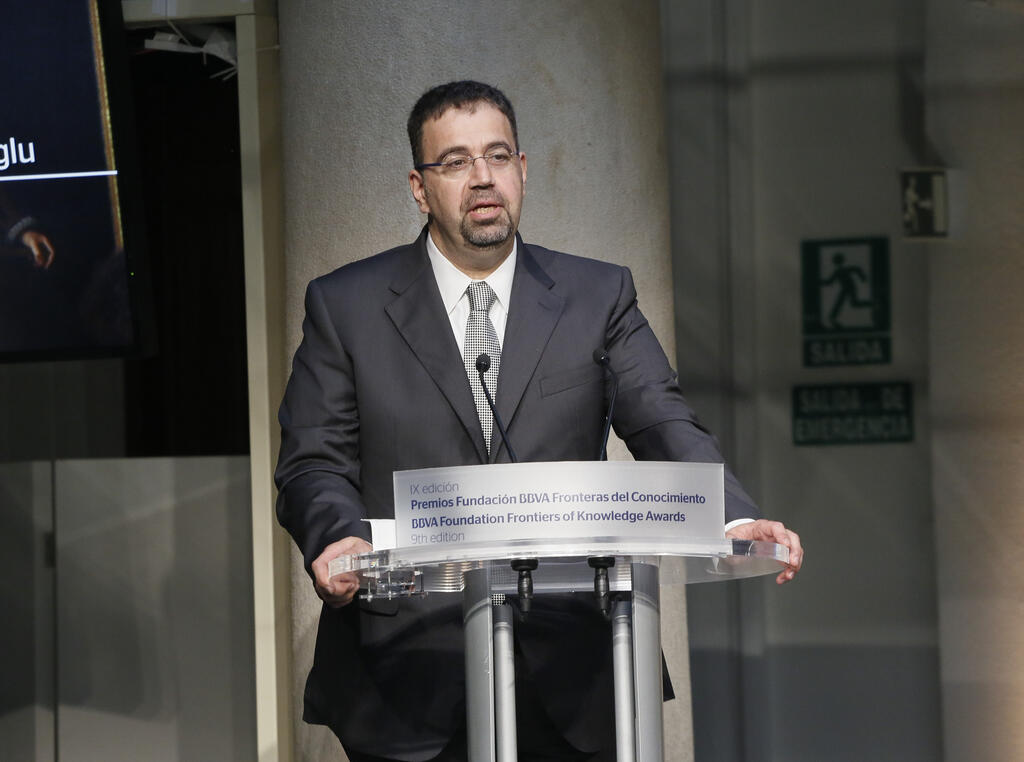
Interview
“I'm not optimistic about the future of the global economy and I don't expect the next 10 years to be particularly good”
Prof. Daron Acemoglu, one of the world's leading economists and a candidate for the Nobel Prize in Economics, sees inflation as a greater threat to democracy and the fight against populism than it is to the cost of living
Prof. Daron Acemoglu of MIT is considered one of the three most important, prominent and quoted economists today - and there is no prize, title or summit that he has not conquered, with the exception of one, the Nobel Prize for Economics, which is likely to be awarded to him in the coming weeks, according to estimates.
It is worth listening to what he has to say because today there is no academic or researcher with a reputation like that of Acemoglu - a Turkish-American of Armenian origin - who is an expert in the main issues of international political economy, including the influence of political and economic institutions on the main macroeconomic variables: growth, economic development and inequality.
Since bursting onto the scene in his early 30s with his book "The Colonial Origins of Comparative Development", Acemoglu has tried and quite succeeded to answer a question that has occupied economists from the beginning of time: What are the factors that explain the existing differences in the wealth of countries.
In 2012 he published another book, "Why Nations Fail?", in which he reached a similar conclusion: political institutions - not culture, natural resources or geography - explain why some countries have become rich while others have remained poor. This is the reason why Acemoglu is considered one of the prominent representatives of institutional economics - a segment in the science of economics that emphasizes the importance of social and political institutions in economic developments. In recent years, he has spent most of his time analyzing the technological changes and the effect of automation on employment and growth, and teaching and raising new generations of economists.
Acemoglu answers the question of whether he now recognizes the beginning of a "new era" with an absolute no. This comes on the back the words of the famous economist Nouriel Roubini, the "prophet of rage" of the global economy, who wrote about two months ago that we are moving from a "great moderation" - a period that began in the 1980s and was characterized by a sharp decrease in macroeconomic volatility - to a "great stagflation".
"I never believed in the theory of the great moderation. In my eyes, what is called the great moderation was a period of building huge financial risks, including in the global supply chain," he says. "There were more obvious risks and there were some more hidden from view. What's more, I'm not optimistic about the future of the global economy and I don't expect the next ten years to be particularly good."
What do you mean?
"There are many problems - a crisis in democracy, a crisis in globalization, and a crisis in inequality - and they are of course the result of the current political path we are on. These problems are the result of ongoing trends from the past and they continue to erode the existing institutions. So if you want to call it a ‘new era’' - you are welcome. But I would not extend it to 2019, nor to 2020. I am of course very disturbed by those dangerous trends, both political and economic, which are becoming even more dangerous now. By the way, I would not count inflation as one of them."
We will talk about inflation, but from your angle: as one of the prominent economists, does its dramatic jump not constitute an important opportunity to bring about a revision in the powers of one of the most important economic institutions today - the central banks?
"I am divided within myself because the current inflation makes me think about two things that conflict with each other. On the one hand, curbing inflation is important because given the market mechanisms, it is a huge 'trust breaker'. When inflation is high, the public begins to lose trust in the system, in money and in the market mechanism. For some it's a conscious and rational process, and for many it's not. When does it happen? Is it when inflation is 2%? I don't think so. When it's 4%? Maybe, but I don't think so either. If it crosses 10%? Probably yes."
Acemoglu, who is Turkish and was in Turkey at the time of the interview, emphasizes that "the Turks lived for two decades with almost 100% inflation. The danger is that trust in the system could be destroyed. This is a real threat and it is a much more significant threat to democracy and the fight against populism than it is to the cost of living itself. That is why the anti-inflation fight is essential. On the other hand, I am always suspicious of technocrats who take over something and there is no balancing democratic mechanism."
According to him, “central banks in democratic regimes are the ultimate example of this. It is clear to all of us that people without knowledge or economic background cannot make decisions, design policies or establish monetary regulation. However, the complete absence of democratic inputs on a critical issue, which is what to do with the money and how much of it should there be - is a problematic thing. Not only because sometimes it succeeds and sometimes it doesn't - but because sometimes they may serve certain groups at the expense of other groups, without even admitting it or noticing it."
How do you resolve these issues?
"It's complex and this complexity receives a lot of attention in these historical moments. I don't have the answer."
You mentioned inflation, inequality, financial risks, a crisis in globalization - these are all a proven recipe for the strengthening and rise of "populism".
"Absolutely. This is one of my biggest concerns. I would only frame the phenomenon under a larger heading: the deterioration of democracy. This is reflected in the deterioration in every parameter that is examined and in every index that indicates the health and robustness of democracy. We are already in a sequence of about 16 years in which the existing democracies are weakening, More countries are abandoning the democratic regime, trust in democratic institutions is declining and it is already at a low level. In addition, political polarization is high, there is a wider place for extreme opinions, and the public's ability to analyze political facts is lower. Populists, mainly on the right, offer a new ‘guide to the perplexed’ after learning from one another. In addition, inequality has been rising for a long time in the U.S., the UK and Israel, and has reached levels that fuel frustration and dissatisfaction. All these things are warning lights for democracy. That's why I said earlier that I don't think inflation is the ultimate challenge now, but that it is another straw. It is not clear which of all the difficulties I mentioned will finally break the camel's back."
The populists use this inflation as a political tool for personal gain and for the purpose of crushing trust in many institutions. Benjamin Netanyahu is building his entire election campaign on the cost of living and the temporarily high inflation - even though he was in power for 12 years and under his reign the cost of living skyrocketed.
"Bibi is the founding father of right-wing populism. He, along with Italy’s Silvio Berlusconi, began concocting the methods upon which many others were later built, such as Marine Le Pen, Donald Trump and even Boris Johnson, to a certain extent. Therefore, I am not at all surprised that’s how he works. It is clear that he will pull the discourse in these directions because it is much easier to sell 'negative' than 'positive'. It is much easier to say 'I am against' instead of offering what you are in favor of. It is much more difficult to carry out reforms that mean creating 'winners and losers' who tomorrow may oppose you. It is clear that Israel too - similar to the USA and the UK - stands at a critical point where it must strengthen its institutions and decide on the direction of its policy. Not only its foreign policy, but especially its domestic policy, including its economic policy."
One of the amazing and sad things now is that in preparation for the upcoming elections in Israel there is no real, deep, meaningful economic discourse. There is no ideological debate. Everything is quite hollow, emotional and above all personal.
"This is an extremely disturbing development because one of the strongest impressions I got the last time I was in Israel, and that was not long ago, is that this is a population that is very involved in the discourse and in shaping the policy. And I am talking about a very high level of intervention and participation in the democratic process, even more than in a large number of European countries. I really hope you don't lose this value within one generation."
2 View gallery


Donald Trump (from right), Marine Le Pen, and Benjamin Netanyahu.
(Photo: Alex Kolomoysky, Reuters, AFP)
The political processes you describe have an effect on the economy. How does the rise of populism affect long-term economic growth for example?
"There is definitely an effect and it is very bad. Limiting inequality creates a kind of prosperity that is more spread over more groups, and this is more possible when the institutions are democratic. All the regimes that emerged from the populist right have been a very bad combination of corruption, inefficiency and inaction. It is very difficult for me to see such regimes bringing any kind of benefit or good news in terms of growth, infrastructure, innovation, education, science. Bolsonaro, the president of Brazil, has set Brazil back environmentally but also institutionally. So did Trump in the USA. Netanyahu in Israel has also caused quite a lot of damage to Israeli institutions as it appears from the outside. And so too with Marine Le Pen, Johnson, and Duterte in the Philippines."
Another phenomenon that is now accelerating and disturbing is the rapid retreat of globalization. How does this affect long-term economic growth?
"I am an expert in the consequences of technological changes and automation on inequality, and there are three common denominators between these issues and globalization that are relevant to our conversation. First, both globalization and technology were presented as 'gifts' to humanity that would free everyone from the cycle of poverty, improve everyone's standard of living and empower us. We know this is not true. Second, both have been presented as 'neutral' phenomena whose trajectory is determined by economic science or other existing knowledge. We know that there was 'selection' in the trajectory and there were many alternative promotion trajectories. For example, you may decide that you will indeed use Israeli technology as a tool for monitoring your citizens and you can decide otherwise. In the same way you can decide that globalization does not have to be a tool for prioritizing capital at the expense of labor and employees. The route or type of globalization that happened in the end was one that allowed the international corporations to arbitrage between the tax systems of the countries, and just as importantly, between differences in employment regulation and differences in workers' rights between different countries."
According to Esmoglu, the third common element between technology and automation and globalization is that the path chosen for their implementation served the powerful players in the system and fueled inequality, and therefore they also clashed head-on with all the ambitions and expectations they aroused at the beginning. "The developments on these two levels only intensify the current populist momentum. On the other hand, I do not think that there is an inherent characteristic - neither in globalization nor in technology and automation - that necessarily causes inequality. You can choose other paths of automation that benefit the working public to the same extent that you can choose other paths of globalization that produce different risks than those that exist today. The current economic reality was supposed to be an opportunity to 'do a different globalization', but I doubt that will happen due to the increase in geopolitical tension, the weakening of democratic institutions and the strengthening of regimes - such as in China and Russia - and their increasing influence in the international arena.”
Speaking of China and Russia, many are already talking about the "Balkanization of the world" - splitting into several geopolitical blocs with separate trade, technology and currency systems. Do you think this is the end of the era of "hyper-globalization"?
"That's not what bothers me and that's not the real problem. At the end of the day, the interdependence between us is big enough and our problems are global enough, so that if the world becomes bipolar, tripolar or multipolar - our problems will be shared: the climate problems are shared, technologies will transfer from country to country, so are pandemics, as we have seen in the age of the Coronavirus. What is happening now, and this is a real problem, is that the current situation increases a double risk that works in the same direction: more likelihood of a real military conflict, and we see this in Ukraine and Taiwan. At the same time, a lower effectiveness among the international institutions to coordinate joint activity, to agree and settle conflicts and disagreements. This is the real problem."
Acemoglu emphasizes in this context that "we must admit that even in their good old days, the international institutions never enjoyed sufficient legitimacy and were not strong enough. Some of those international institutions were excessively lenient towards China, in the negative sense of the word, and some of them were too committed, sometimes in appearance and sometimes in practice, to U.S. interests and were not independent enough. All of this contributes to their current complex and dangerous situation."
Finally, what are your thoughts about "the great resignation". Is there really such a phenomenon, or is it a natural and permanent dropout of more and more unskilled workers who remain irrelevant and are forced to leave the labor market?
"Indeed, it’s an important question. This is a time of great confusion on this issue. The data shows a rapid increase in the wages of those unskilled, low-wage workers at the bottom of the income distribution in the U.S.. That's a really great thing because that hasn't happened in many, many decades in the U.S.. If that's the case, it may indicate a combination of increased demand for workers along with employment safety nets that protect those workers who will no longer be completely at the mercy of their employers. It's no longer 'Work at McDonald's for $6 an hour or starve to death'. Therefore, the conclusion is that wages at the bottom can indeed recover and this will be a great inspiration. On the other hand, we have seen how real wages lag behind inflation, so it is already less worth it if wages run but inflation runs faster.”














